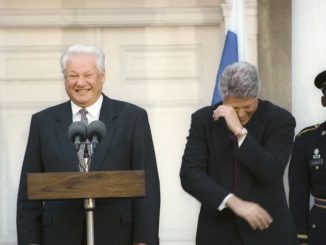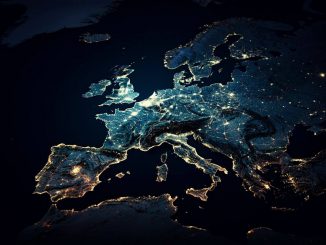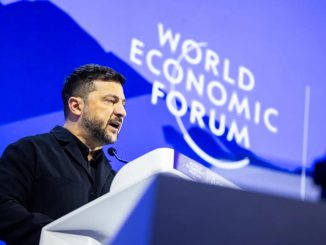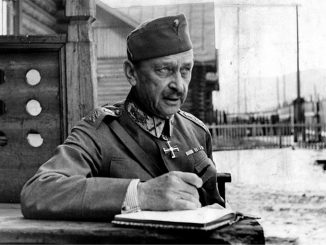Putin’s objective is clear: to use the US president as an accomplice, whether conscious or not, to force Ukraine to make territorial concessions and capitulate. The meeting, which was supposed to be about ‘pursuing peace’ in Anchorage, turned into ‘self-inflicted humiliation’ for Washington, without any concessions in return. Fascinated by the former KGB officer, Trump offered him spectacular legitimisation on American soil. If the worst, a ‘Yalta of the Arctic’,[1] seems to have been avoided for the time being, European leaders are expected at the White House this evening to try to reason with a president who advised Ukraine to ‘accept the deal’ by summoning Zelensky to the Oval Office, alone, to better make him bend, who will then be joined by several leaders who have come to support him. What Europeans should remember is that they are in a position of strength, as historian Françoise Thom [*] pointed out in an article published in Le Monde,[2] because Russia is economically dependent on Europe. However, these leaders must prove themselves equal to the task, unlike their predecessors in Munich. This would be an excellent start for the ‘new diplomacy’ referred to yesterday by Emmanuel Macron. After the fine words, it is now time to take action by supporting Ukraine and thwarting such a crude and despicable trap set by a country that we still want to believe is our ally. Editor’s note
“Facing Putin, Europeans are in a position of strength”
Table of Contents
by Joël-François Dumont — Paris, 18 August 2025 —
Introduction: A Call for Strategic Lucidity in the Diplomatic Fog
In a dense and impactful op-ed published in Le Monde on August 14, 2025, historian Françoise Thom delivers an analysis that serves as a strategic intervention, an attempt to pierce what she calls the “diplomatic fog” to reach the “only solid ground at our disposal: Russian objectives.”[1] The article is built around a central thesis, as direct as it is provocative: “The Trump administration is in the process of rescuing the Putin regime, which it needs to blackmail Europe.”[1] This assertion, made in the preamble to a hypothetical meeting between the American and Russian presidents, serves as the starting point for a rigorous deconstruction of the Kremlin’s strategy and an urgent call for a European strategic awakening.
Françoise Thom’s objective is not to offer a simple commentary on current events, but to radically change the paradigm through which European leaders perceive their situation. She strives to replace the dominant feeling of weakness and reactive crisis management with a proactive and confident posture, based on a keen awareness of European levers of power and Russia’s fundamental vulnerabilities.
This report aims to dissect this analysis in depth. It will successively examine Françoise Thom’s deconstruction of the historical constants of Russian strategy, the anatomy of the geopolitical trap she detects in the Russo-American “deal,” the existential nature of the threat Russia poses to Europe, and finally, the outlines of the strategy she prescribes for Europeans. Thom’s analysis constitutes a full-fledged intellectual attack on two predominant Western schools of thought: on one hand, the “realist” school, which, in the name of supposed stability between great powers, is often ready to sacrifice smaller nations; on the other hand, the liberal internationalist school, which holds out hope of integrating or appeasing Russia through negotiation and dialogue. Thom proposes a third way, a form of principled realism where strength and influence stem not only from military power but from an inflexible adherence to principles, supported by coercive economic power. By asserting that Europeans are in a “position of strength“[1] and rejecting any negotiation involving a “betrayal“[1] of Ukraine, she outlines a doctrine where European power is expressed through the ability to set non-negotiable conditions—a clear break from the logic of accommodation.
I. The Kremlin’s Modus Operandi: A Historical Deconstruction
At the heart of Françoise Thom’s analysis lies the conviction that Russia’s current actions are neither erratic nor improvised, but follow a strategic playbook whose principles have been observable for centuries. For her, understanding this modus operandi is the only reliable anchor in a confusing international environment. She identifies two interdependent pillars of Russian expansionism: the use of a foreign accomplice and the application of “salami tactics.”
A. A. The doctrine of foreign complicity: From Poland in the 18th century to the dismemberment of Ukraine
The historian argues that Russian territorial expansion has rarely been a solitary act. It almost systematically relies on a prerequisite: the neutralization or instrumentalization of other powers. Thom recalls that “most of the territorial expansions of the Russian Empire were carried out with the complicity and help of one or more foreign powers.”[1] She supports this claim with precise and devastating historical examples:
- The partition of Poland in 1772, carried out “in the wake of Prussia and Austria.”[1]
- The reconquest of the Caucasian states in 1920-1921, conducted “by reaching an agreement with Turkey.”[1]
- The reconquest of the Baltic states and the annexation of Galicia in 1939, made possible by “relying on Germany” via the Molotov-Ribbentrop Pact.[1]
These historical precedents are not mere academic reminders; they serve to contextualize the contemporary situation and strip it of its supposedly unprecedented character. By asking the rhetorical question, “Why not use Donald Trump to subdue Ukraine?“,[1] Thom positions the potential alignment between Washington and Moscow not as a historical anomaly, but as the logical continuation of a centuries-old strategy. The Trump administration thus becomes the modern foreign accomplice, the indispensable tool allowing the Kremlin to pursue its expansionist goals at a reduced cost.
B. “Salami Tactics” as Asymmetric Warfare
The second pillar of Russian strategy is the method by which expansion is actually achieved. Thom describes it as “salami tactics,” an incremental approach where Russia “slices up its victim (first Crimea, then Donbas…); once the first slice is acquired, it moves on to the second, then the third.”[1] This method is designed to be asymmetrical: each aggression is presented as a limited, local, and manageable crisis, the stakes of which never seem to justify a massive and unified Western response. By fragmenting its aggression, the Kremlin paralyzes its adversaries’ decision-making process, exploits their desire to avoid escalation, and buys time to consolidate its gains.
The article offers a perfect illustration of this process through the Russian proposals transmitted to the American envoy Steve Witkoff. Moscow would demand that the United States “force the Ukrainians to evacuate the parts of the Donetsk region they still control, which are the strongest fortified lines on the Ukrainian front,” in exchange for a “symbolic piece of territory in the Sumy region.”[1] This proposal is a textbook case. On the surface, it is a land swap that could be presented as a compromise. In reality, it is a maneuver aimed at obtaining a decisive strategic advantage without a major military effort. The abandonment of the Donetsk fortifications would offer Russia “strategic springboards for the conquest of central and southern Ukraine.”[1]
These two strategies are not merely parallel; they are deeply symbiotic. The doctrine of the foreign accomplice is the enabling condition for salami tactics. To obtain a “slice” of its victim, especially when it is difficult to conquer militarily, the Kremlin needs an external actor to exert the necessary diplomatic, political, or economic pressure. In the Donetsk example, Russia can only achieve this withdrawal by force at the cost of considerable losses. It therefore seeks to co-opt an accomplice—the Trump administration—to “force” Ukraine to yield. The accomplice thus provides the political cover and leverage that allow the tactic to be executed, isolating the victim and neutralizing international opposition. This cycle—identifying a target, assessing the cost, co-opting an external partner to reduce that cost, acquiring the target—constitutes the true engine of the expansionist model described by Françoise Thom.
II. The Trump Variable: Anatomy of a Geopolitical Trap
Françoise Thom’s analysis then focuses on the nature of the interaction between the Kremlin and the Trump administration. She portrays it not as a classic alliance, but as a convergence of cynical interests, orchestrated by Moscow through a sophisticated trap that specifically targets the American president’s psychological and ideological profile.
A. The “Tempting Piece of Cheese”: Deconstructing the Lure
The trap, which Thom calls a “mousetrap,” is baited with a particularly seductive lure: a “sumptuous ‘deal’.”[1] The terms of this agreement are brutally clear. In exchange for decisive American help in Ukraine, the lifting of sanctions, and renewed access to Western technologies, Russia would offer an American company a monopoly on “the management and resale of its gas destined for Europe.”[1] This lure is designed to be irresistible to an administration that prioritizes transactional and immediate gains over long-term strategic considerations.
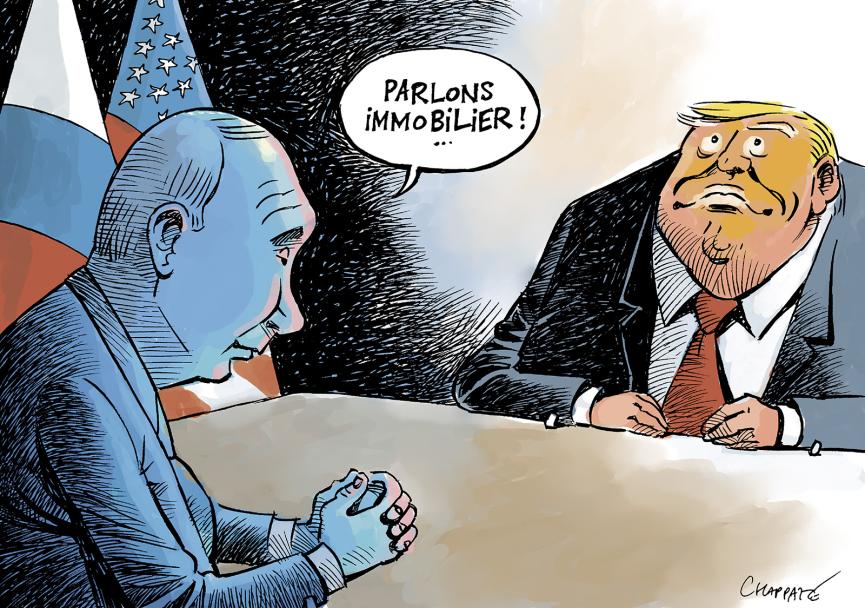
However, the historian immediately warns against the illusory nature of this offer, once again drawing on historical precedents. She recalls the grim fate of concessions granted by the Kremlin in times of economic weakness: “as soon as Westerners have invested and launched production, the Russian government despoils the foreign partner, who is lucky to save even a few feathers.”[1] The “deal” is therefore not a partnership, but a temporary maneuver to attract Western “cash cows” while the Russian economy recovers.[1] Russia, she explains, “uses the promise of business for purposes of power.”[1]
B. Power Politics as Extortion: A Meeting of Minds
The reason this trap is so effective, according to Thom, lies in a fundamental convergence of worldviews. The Kremlin has found its “dream partner” in Donald Trump precisely because the latter, like Vladimir Putin, “reduces foreign policy to racketeering and extortion.”[1] This symmetry in their approach to international relations creates a unique channel of communication and understanding, where traditional diplomatic norms, alliances, and international law are seen as obstacles to profitable transactions.
The Kremlin’s approach is also psychological. It targets Trump’s “vanity, ignorance, and foolishness.”[1]
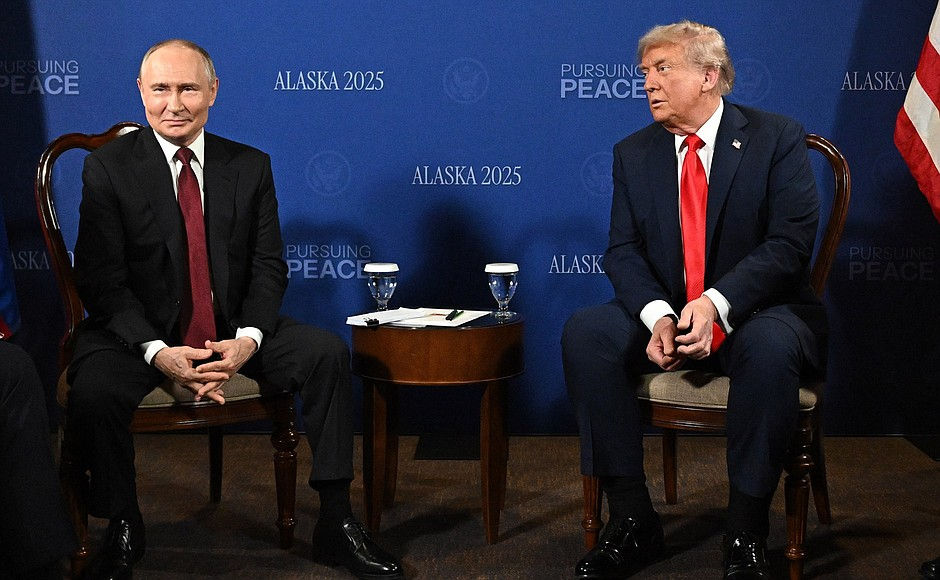
The “deal” is structured not to serve the American national interest, but to flatter a leader’s ego by offering him a tangible and lucrative personal victory. Thom’s insinuation that “Trump would be entitled to his share of this fabulous windfall“[1] takes this logic to its conclusion, suggesting that the convergence is not only ideological but potentially corrupt.
This dynamic reveals a sophisticated form of manipulation that could be described as a psychological mirror. The Kremlin does not just offer a bribe; it formulates an offer that reflects and validates its target’s transactional worldview. By structuring the agreement as an exchange of a strategic asset (Ukraine’s security) for a commercial monopoly (gas sales), Moscow “speaks Trump’s language.” This approach signals an understanding and acceptance of his methods, which is inherently flattering to the ego and reinforces the feeling of making a good deal. In doing so, the Kremlin bypasses the traditional filters of foreign policy analysis (which would weigh the cost of abandoning an ally, the impact on American credibility, etc.) to reframe the decision as a simple business transaction. The genius of the trap lies in its ability to make the target feel understood and validated in their own cynicism, thus lowering their guard and making them more likely to accept a deal that is fundamentally contrary to their country’s strategic interests.
III. The Metaphysical Threat: Russia as a “Machine of Destruction”
Françoise Thom’s analysis then rises above traditional geopolitics to address what she considers the deepest and most alarming dimension of the Russian threat. For her, this threat is not merely territorial or military; it is civilizational, aimed at the very foundations of the European political and moral order.
A. War by Demoralization
Thom portrays Russia as an “immense machine of destruction.”[1] She warns that after Ukraine, this machine “will rush against Europe,” but not necessarily in a conventional form. The assault will “not necessarily take the form of a military invasion but through demoralization and the spread of hatred, stupidity, suicidal national egoism, and nihilism.”[1] These are not kinetic weapons, but cognitive and moral ones. They aim to corrode the social and political fabric of European democracies from within, to undermine trust in institutions, to exacerbate divisions, and to promote a cynical worldview where only raw power relations matter.
To lend weight to this dark prophecy, Thom anchors this future threat in Russia’s past and present behavior. She highlights “the relentlessness with which Russia has destroyed Ukraine for decades,” doing so by destroying its own prosperity “for the sole pleasure of crushing a neighbor who wanted to be free.”[1] This point is crucial: it establishes a motive that transcends rational national interest. Russian aggression is not just a quest for territory or security, but the expression of a destructive and nihilistic impulse, a hatred of the freedom and sovereignty of others.
This conception of the threat suggests that Russia’s ultimate strategic goal is not conquest, but contagion. The aim is to export the characteristics of its own political system—cynicism, division, corruption, and falsehood as a principle of governance—into the European body politic. By spreading “hatred,” “stupidity,” and “suicidal national egoism,” the Kremlin seeks to weaken Europe from within, render it incapable of collective action, and neutralize it as a competing civilizational model. The war in Ukraine, from this perspective, is much more than a territorial conflict; it is both a demonstration of this destructive will and a vector of this ideological contagion. The “destruction” Russia seeks to inflict on Europe is not that of cities and infrastructure, but that of the European project itself, its values, and its cohesion.
IV. The European Imperative: From Latent Strength to Strategic Action
The final part of Françoise Thom’s analysis is prescriptive. After making her diagnosis, she proposes a strategy for Europe, one that relies on a complete reversal of the perception of the balance of power.
A. The Paradox of Power: Russia’s Structural Dependence on Europe
The most counter-intuitive and central assertion of the article is that, “without knowing it, Europeans are in a position of strength.”[1] Thom bases this conviction on an analysis of Russia’s structural vulnerabilities, which are often masked by its aggressive military posture. The sources of this European strength are multiple:
- A historical dependence: Thom argues that, in the long run, “the Russian Empire only held on thanks to Europeans co-opted by the Russian power.”[1] This statement suggests a structural dependence that is not only economic but also political and cultural for the stability and development of the Russian state.
- A contemporary economic reality: The failure of the autarky strategy and the “pivot to China” has been a “calamitous experience” for Russia. Far from offering a viable alternative, this policy has reinforced among Russian elites a “keen awareness of their dependence on Europe” for technology, investment, and markets.[1]
- The insufficiency of the American partner: In the scenario of a deal with Washington, Thom believes that “Trump’s America will not be enough to refloat the Russian economy.”[1] The United States cannot substitute for the depth and complexity of the economic ties that bind Russia to Europe.
B. A Strategy of Principled Coercion
Based on this assessment, Thom calls on Europe to actively use its levers of power. She details a series of concrete actions that constitute a genuine strategic doctrine:
- Strategic dissociation: Europe must first and foremost “clearly dissociate itself from the American betrayal.”[1] This means refusing to endorse or participate in any agreement that would sacrifice Ukraine’s sovereignty on the altar of supposed appeasement.
- Direct security engagement: Rather than delegating the continent’s security, Europe must take responsibility. It must “demand security guarantees for Kyiv” and “insist on the deployment of European forces in Ukraine” so as not to leave the country alone to face its aggressor.[1]
- Unambiguous economic leverage: The primary tool of coercion is economic. Europeans must state unequivocally that “business (including gas purchases) will only resume with Russia when it has evacuated the occupied territories.”[1] This simple and clear ultimatum directly links economic normalization to respect for international law.
The ultimate goal of this strategy is not simply to contain Russia or freeze the conflict. It is more ambitious: it is to create the internal and external conditions for “Russia to rid itself of autocracy,”[1] because this, according to Thom, is the only way to guarantee European security in the long term.
This approach constitutes a form of asymmetric strategy. Aware that Russia’s strength lies in its military apparatus and its capacity for subversion, Thom proposes shifting the conflict’s center of gravity. Instead of responding to Russia on its preferred terrain, Europe must impose its own: the economy. Europe’s strength is systemic, economic, and technological. By making economic normalization the key variable of the conflict, Europe refuses to be drawn into a game of military attrition or diplomatic manipulation defined by Moscow. On the contrary, it forces the Kremlin to confront its most glaring structural weakness: its vital dependence on European capital, technology, and markets. This is a classic strategy that consists of not attacking the opponent’s strong point, but their most critical weak point.
Conclusion: The Imperative of Lucidity
Ultimately, Françoise Thom’s op-ed is much more than an analysis of the current situation. It is a powerful antidote to strategic confusion and resignation. She argues that Russia’s aggressiveness is not a sign of strength, but a symptom of profound economic weakness and structural dependence. She demonstrates that the Kremlin’s methods, far from being unpredictable, are historically consistent and therefore, to some extent, foreseeable. Finally, she portrays the potential alignment with the Trump administration not as an inevitability, but as a trap based on a cynical synergy that can and must be thwarted.
The central message of the article is a call to awareness. Europe’s greatest vulnerability, Thom suggests, is not its lack of military or economic power, but its lack of awareness of the power it actually holds. Her call to action is an exhortation to embrace a principled realism, to use Europe’s immense economic leverage not only to defend its interests but also to enforce its values in the face of a regime she describes as nihilistic and destructive. Françoise Thom’s analysis thus offers an essential intellectual framework for navigating the perilous geopolitical landscape of our time, a framework that substitutes the clarity of historical analysis and the firmness of principles for the “fog” of diplomacy and short-sighted calculations.
Joël-François Dumont
Sources and Legends
[*] Françoise Thom’s latest book, La marche à rebours ; regards sur l’histoire soviétique et russe (Sorbonne Université Presses), has been awarded the François Guizot-Institut de France Prize, reserved for historians (Institut de France) —
[1] Thom, Françoise. “Face à Poutine, les Européens sont en position de force” [Facing Putin, Europeans are in a position of strength]. Le Monde, August 14, 2025.
[1] Voir l’analyse de Laure Mandeville, envoyée spéciale du Figaro : « A Anchorage, l’ascendant du maître du Kremlin face au bâteau ivre de la diplomatie américaine » — (2025-0818) —
[2] Voir Françoise Thom : « Face à Poutine, les Européens sont en position de force : L’administration Trump est en train de réaliser le sauvetage du régime de Poutine, dont elle a besoin pour racketter l’Europe, estime l’historienne, avant la rencontre entre Trump et Poutine » in Le Monde du 14 août 2025 p.22 —
[3] Voir « Anchorage – Un sommet de symboles, pas de substance » — (2025-0816) —
Voir également :
- « Le bateau ivre face à l’iceberg du Kremlin » — (2025-0818) —
- « La diplomatie de l’humiliation » — (2025-0818) —
In depth Analysis
The Anchorage summit, orchestrated by Russia, aimed to « use the American president as an accomplice, consciously or not, to force Ukraine into territorial concessions and make it capitulate. » This event is characterized as « self-inflicted humiliation » for Washington, lacking any reciprocal concessions from Russia.
Françoise Thom’s analysis provides a critical framework, asserting that « The Trump administration is in the process of saving the Putin regime, which it needs to extort Europe. » She argues that Russia’s actions are part of a consistent historical strategy involving a « foreign accomplice » and the « salami tactic, » designed to incrementally undermine victims while appearing to seek compromise. Thom contends that the proposed « deal » with the US is a « lure » intended to exploit Trump’s transactional approach to foreign policy, ultimately aimed at weakening Europe.
Crucially, Françoise Thom highlights that « Europeans are in a position of strength » due to Russia’s economic dependence on Europe. She advocates for a resolute European strategy involving clear dissociation from any US « betrayal » of Ukraine, direct security guarantees for Kyiv, and the use of economic leverage to force Russian withdrawal from occupied territories. The overarching theme is a call for European strategic lucidity and proactive engagement to counter Russian aggression, which is framed as a « metaphysical threat.
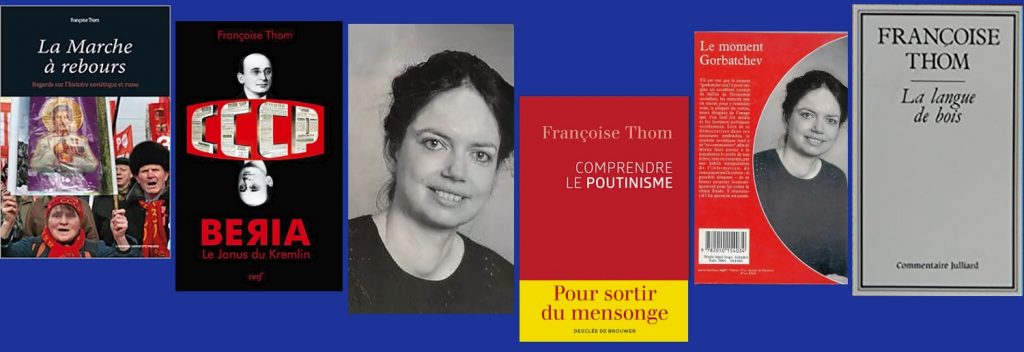
- ‘The cesspool and chaos: the Russian connection in the Epstein Affair’ in Desk Russia — (2025-0730)
- « Le cloaque et le chaos : la Russian connexion de l’affaire Epstein » in Desk Russie — (2025-0728) —
- „Die Kloake und das Chaos: Die russische Verbindung der Epstein-Affäre“ — (2025-0728) —
- « Клоака і хаос: російський зв’язок у справі Епштейна » — (2025-0728) —
- « La paille et la poutre : une réponse européenne aux idéologues trumpo-poutiniens » in Desk Russie — (2025-0708) —
- « The Pot Calling the Kettle Black: A European Response to Trump and Putin Ideologues » in Desk Russia — (2025-0708) —
- « A Disaster of the First Magnitude » in Desk Russia — (2025-0706) —
- « Toward a Putin–Trump Pact? in Desk Russia — (2025-0430) —
- « Vers un pacte Poutine-Trump ?» in Desk Russie — (2025-0429) —
- « Toward a Putin–Trump Pact? » in Desk Russia — (2025-0430) —
- « Russia’s Plan for the United States » in Desk Russia — (2025-0413) —
- « Le projet russe pour les États-Unis » in Desk Russie — (2025-0329) —
- « Vladimir Putin’s Twofold Revenge » in Desk Russia — (2025-0304) —
- « La double vengeance de Vladimir Poutine » in Desk Russie — (2025-0303) —
- « The Lessons of Trumpism for Europeans: How to Avoid a ‘Self-Putinization’ of the EU » in Desk Russia — (2025-0225) —
- « Les leçons du trumpisme pour les Européens : comment éviter une autopoutinisation de l’UE » — in Desk Russie — (2025-0223) —

Desk Russie vous rappelle que Françoise Thom va présenter un cycle de cinq conférences : « Les instruments et les méthodes de projection de puissance du Kremlin de Lénine à Poutine », dans





